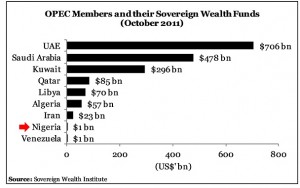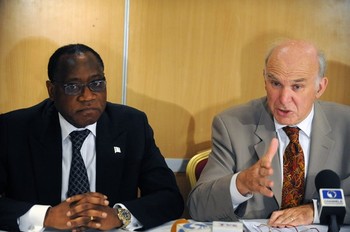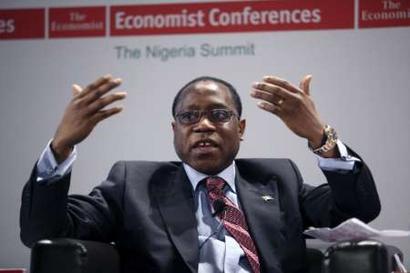The Battle for lost grounds of Nigeria’s sovereign wealth
In this maiden edition of ‘From our Economics Desk’, we take a look at one of the most topical issues in Nigeria – the Sovereign Wealth Fund (SWF). While political battles are being fought over the Fund’s legality and frugality, we choose to pitch a different battle for the lost grounds of Nigeria’s sovereign wealth ranking among its oil producing peers.
Pitching the battle
The Nigeria Sovereign Investment Authority (NSIA) was established in May 2011 to replace the loosely structured Excess Crude Account (ECA) with a more formal structure that would “receive, manage and invest” oil revenues earned above the benchmark oil price, in order to: (a) build a savings base for the Nigerian people (b) enhance the development of Nigerian infrastructure and (c) provide stabilization support in times of economic stress. These three objectives define the ring-fenced portfolios within the SWF – i.e., the Future Generations Fund, the Nigeria Infrastructure Fund and the Stabilization Fund.
Prior to the establishment of the Fund, Nigeria was one of only three members of the Organisation of Petroleum Exporting Countries (OPEC) without an SWF. However, with the recent seeding of US$1 billion to the Fund from the ECA (barring any court injunctions); the country has officially achieved sovereign wealth status. Therefore, with effectively US$1 billion in assets under management (AuMs) Nigeria now ranks 18th in the world’s largest 20 SWFs from oil revenues. This contrasts the country’s lofty ranking as the largest oil producer in Africa as well as the seventh largest oil producer in the world. And this is where we pitch our battle.
The sovereign wealth market
 Since then, SWFs have since gained ascendancy into the 21st century and operate in two generic forms as Stabilisation Funds and/or Savings Funds.Although the term sovereign wealth fund was first used in 2005, such funds date back to the Kuwait Investment Authority in 1953, an SWF from oil revenues (Oil-SWF) operating at a time when Kuwait was a British colony. Incidentally, Nigeria was also a British colony like Kuwait when oil was first discovered within her territory in 1956 – some three years after the Kuwait’s SWF was created.
Since then, SWFs have since gained ascendancy into the 21st century and operate in two generic forms as Stabilisation Funds and/or Savings Funds.Although the term sovereign wealth fund was first used in 2005, such funds date back to the Kuwait Investment Authority in 1953, an SWF from oil revenues (Oil-SWF) operating at a time when Kuwait was a British colony. Incidentally, Nigeria was also a British colony like Kuwait when oil was first discovered within her territory in 1956 – some three years after the Kuwait’s SWF was created.
These funds are believed to help mostly resource-rich economies, such as the oil producers, avoid the resource curse by supporting volatile government revenues in the bust of the economic cycle, among other benefits.
It should therefore come as second nature for an OPEC member country to save excess oil earnings, given the peculiar nature of the source of this revenue –i.e., a highly demanded and variably priced, non-renewable energy resource.
Today, Oil-SWFs account for about 55% of the world’s estimated US$4.8 trillion sovereign wealth market and OPEC member countries control 36% of that market.
Oil vanquished
Nigeria has been quite unsuccessful in its attempts at building sustainable excess oil savings as serial withdrawals continue to befall excess petro dollars at the slightest substantial accretion to the erstwhile ECA. Excess crude savings have tumbled from about US$34 billion in 2004 at the onset of the ECA, to US$20 billion in 2007.
By December 2010, the ECA held less than US$1 billion but this has now risen to about US$5-6 billion as of October 2011, pre-launch of the SWF. If we were to re-write history, by simply assuming that Nigeria saved every dollar per barrel earned above budget benchmarked oil prices since 2004, without any withdrawals, then the ECA would have gathered a minimum of US$ 65 billion in legacy savings for the SWF to manage.
All hope is not lost
Perhaps these lost grounds can be re-conquered as the government strives hard to activate the SWF machinery currently clogged up by sub-national politics. Besides investing US$1 billion initial capital, the Federal Government has taken steps to constitute a board for the Fund by the end of the year and has also gone ahead to shop for fund managers and co-investors to the Fund.
According to news sources, America’s Wall Street bankers have now taken a keen interest in this regard, as if to accredit an investment vehicle developed by one of their own – Olusegun Aganga, a former Director at Goldman Sachs who established the Fund while serving as Nigeria’s Finance Minister (now serving as Trade and Investment Minister) and who may subsequently oversee the operations of Fund.
Analysts estimate that about US$2.5 billion could accrue to Nigeria’s sovereign wealth fund annually and, if oil prices hold in the medium-term, the Fund would have received at least US$79 billion in excess oil earnings by 2020. This is more than double the highest amount the ECA has ever held at any point in its now ending lifetime. Perhaps the lost grounds of Nigeria’s sovereign wealth can be re-conquered▪









charles onuoha
October 31, 2011 at 1:24 pm
I wellcome this idea. It sounds good. For once let us think about the future and save money by contributing towards the sovereign wealth funds market.With good managment of this fund our economy could be on its way to the prestructural adjustment era. ONUOHA C.